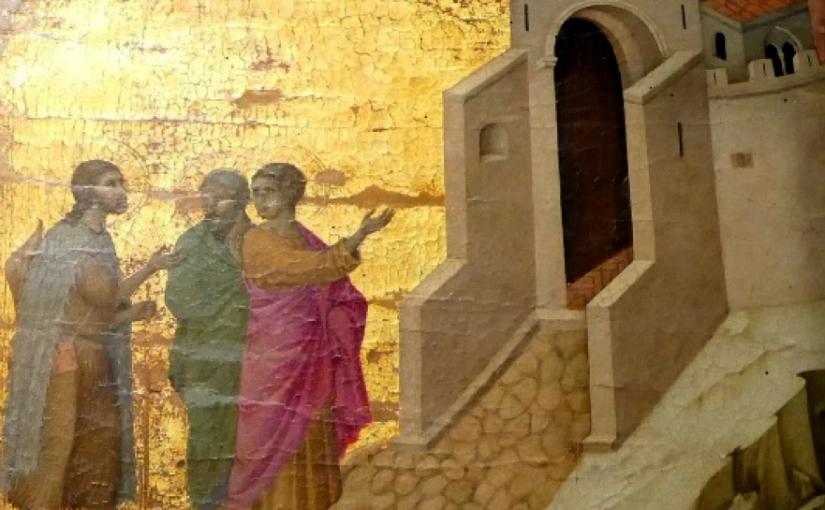by Karen Hoover
“Are you the only visitor to Jerusalem who does not know the things that have happened there in these days?” Luke 24:18
It is now the week after Easter and the culmination of our Lenten journey. This year my Lenten journey was enriched by reading the 2019 UCC Lenten Devotional Take Nothing with You and Borg & Crossan’s The Last Week with the Art Lectionary class. In addition, we made our first visit to Florence and soaked up all of the glorious art there! As a result, I’m still sifting through many more new images, words, and reflections on the meaning of Easter—for the church and for me.
This year my “Easter takeaway” is the metaphor of the road or journey. According to Luke (24:13-35), on Easter Sunday morning, the day of his resurrection, Jesus joins two of his followers walking on the road to Emmaus. They do not recognize him until, after accepting their invitation to stay the night, he blesses and breaks the bread at their evening meal—and then vanishes from their sight. Borg & Crossan suggest several meanings in this scripture: Jesus journeys with us and we do not always recognize him, but we do recognize him in the sharing of bread. For us, as followers of Jesus, the Emmaus Road story provides both comfort in knowing that Jesus is always with us and the reminder that Jesus is present in the act of offering bread to one another, as he has commanded us to do.
However, there is another road that is my “takeaway” image this Easter season. It leads me back to the start of Holy Week—to the road that Jesus travelled on Palm Sunday. This road was the path to his death because it led him to Jerusalem and his confrontation with the political system of his time. Borg & Crossan call it the “domination system” and it required his crucifixion as a criminal because he challenged its injustices and authority.
But God had the last word! Borg & Crossan put it beautifully when they declare that Easter is the reversal of Good Friday—it is God’s “NO!” to the powers who killed Jesus. I can’t say it better so let me share this paragraph:
“The story of Holy Week enables us to hear the passion of Jesus. His passion was the kingdom of God, what life would be like on earth if God were king, and the rulers, domination systems, and empires of this world were not. It is the world that the prophets dreamed of—a world of distributive justice in which everybody has enough and systems are fair. And it is not simply a political dream. It is God’s dream, a dream that can only be realized by being grounded ever more deeply in the reality of God, whose heart is justice.”
God of Easter—help me to walk in the footsteps of Jesus—the passionate Jesus on the road to Jerusalem and the resurrected Jesus on the road to Emmaus.




